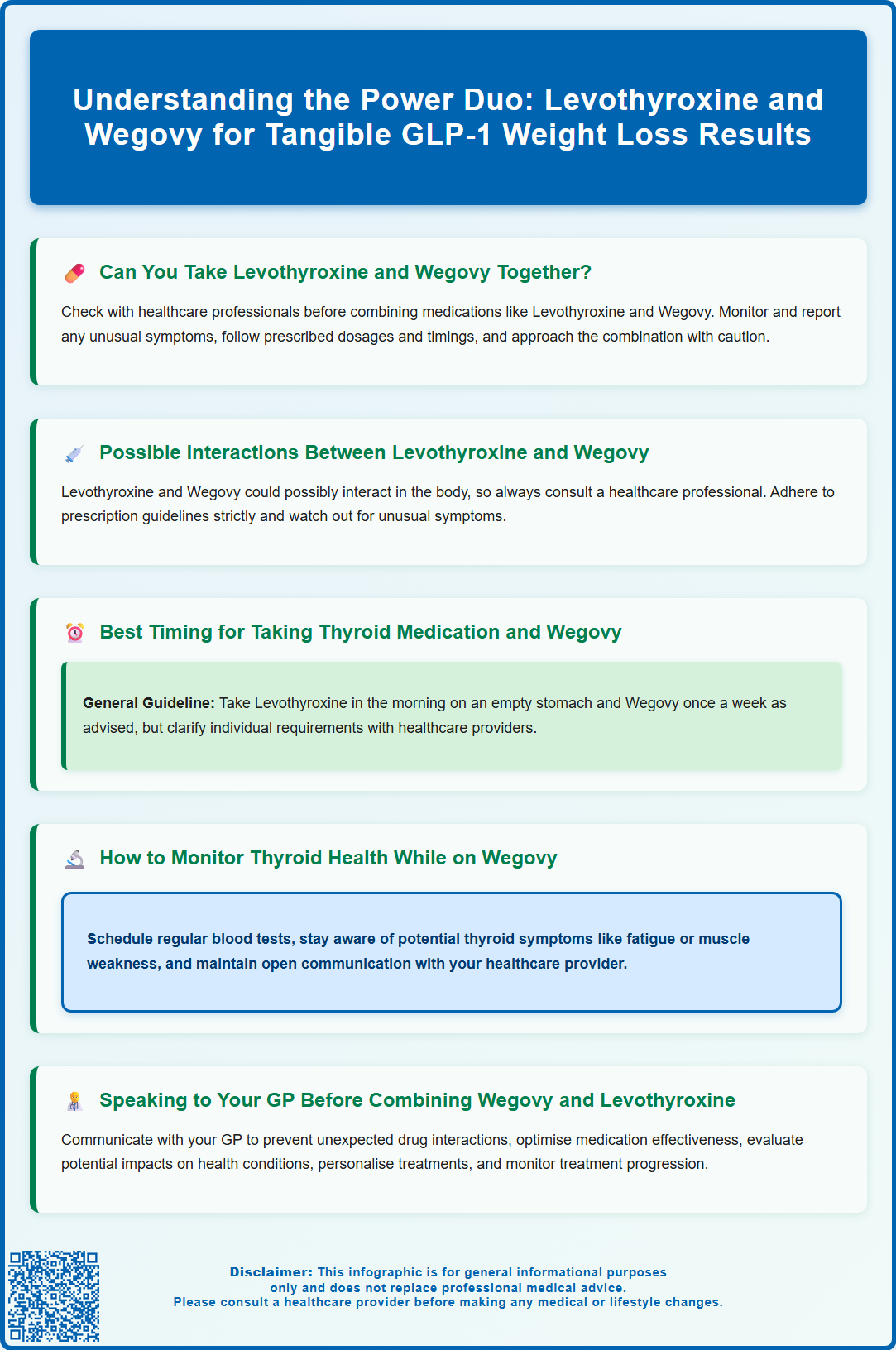Many patients taking levothyroxine for hypothyroidism are considering Wegovy (semaglutide) for weight management. Levothyroxine and Wegovy can generally be taken together under appropriate medical supervision, though the combination requires careful monitoring. Levothyroxine is a synthetic thyroid hormone replacement for underactive thyroid, whilst Wegovy is a GLP-1 receptor agonist licensed in the UK for chronic weight management. These medications work through different mechanisms, but Wegovy's effect on gastric emptying may influence levothyroxine absorption. Weight loss achieved with Wegovy can also alter thyroid hormone requirements, necessitating dose adjustments. Always consult your GP or endocrinologist before starting this combination.
Summary: Levothyroxine and Wegovy can generally be taken together safely under medical supervision, though thyroid function monitoring and potential dose adjustments are required.
- Levothyroxine is a synthetic thyroid hormone replacement; Wegovy is a GLP-1 receptor agonist for weight management—they work through different mechanisms.
- Wegovy delays gastric emptying, which may affect levothyroxine absorption, requiring careful monitoring of thyroid function tests.
- Weight loss from Wegovy can reduce levothyroxine requirements, necessitating dose adjustments guided by TSH levels checked every 6-8 weeks after changes.
- Levothyroxine must be taken on an empty stomach 30-60 minutes before food; Wegovy is a weekly subcutaneous injection given at any time.
- More frequent thyroid monitoring (every 8-12 weeks initially) is recommended when starting Wegovy in patients taking levothyroxine.
- Wegovy is contraindicated in pregnancy and should be stopped at least two months before planned conception; levothyroxine requirements increase during pregnancy.
Table of Contents
- Can You Take Levothyroxine and Wegovy Together?
- How Wegovy May Affect Thyroid Function and Levothyroxine Dosing
- Timing Your Doses: Levothyroxine and Wegovy Administration
- Monitoring Thyroid Levels When Using Both Medications
- What to Tell Your Doctor Before Starting Wegovy with Levothyroxine
- Scientific References
- Frequently Asked Questions
Can You Take Levothyroxine and Wegovy Together?
Many patients with hypothyroidism who are prescribed levothyroxine may also be considering Wegovy (semaglutide) for weight management. The good news is that there is no absolute contraindication to taking these medications together, and many individuals successfully use both under appropriate medical supervision. However, the combination requires careful consideration and monitoring by your healthcare team.
Levothyroxine is a synthetic thyroid hormone replacement used to treat an underactive thyroid gland, whilst Wegovy is a glucagon-like peptide-1 (GLP-1) receptor agonist licensed in the UK for chronic weight management in adults with obesity (BMI ≥30 kg/m²) or overweight (BMI ≥27 kg/m²) with at least one weight-related comorbidity, as an adjunct to diet and physical activity. These medications work through different mechanisms, but it's important to note that GLP-1 receptor agonists like Wegovy delay gastric emptying, which could theoretically affect the absorption of oral medications including levothyroxine.
Weight loss achieved through Wegovy can influence thyroid hormone requirements. As body weight decreases, the dose of levothyroxine needed to maintain optimal thyroid function may change, necessitating dose adjustments. Additionally, both medications require specific administration instructions that must be followed to ensure optimal absorption and efficacy.
It is crucial that any decision to start Wegovy whilst taking levothyroxine is made in consultation with your GP or endocrinologist. They will assess your individual circumstances, current thyroid control, cardiovascular health, and weight management goals to determine whether this combination is appropriate for you. Women of childbearing age should be aware that Wegovy is contraindicated in pregnancy and should be discontinued at least two months before a planned pregnancy, while levothyroxine requirements typically increase during pregnancy.

How Wegovy May Affect Thyroid Function and Levothyroxine Dosing
Wegovy's primary mechanism involves activating GLP-1 receptors in the brain and gastrointestinal tract, which reduces appetite, slows gastric emptying, and promotes satiety. These effects lead to reduced caloric intake and subsequent weight loss. Whilst semaglutide does not directly alter thyroid hormone production or metabolism, the weight loss it facilitates can have indirect effects on thyroid hormone requirements.
Levothyroxine dosing is individualised according to UK practice, with factors such as age, weight, cardiac status, and severity of hypothyroidism all considered. The BNF recommends starting with lower doses in older patients or those with cardiac disease. As patients lose significant weight on Wegovy—clinical trials (STEP programme) have demonstrated average weight reductions of approximately 15% of initial body weight at 68 weeks—their levothyroxine requirements may decrease proportionally.
The delayed gastric emptying caused by semaglutide could potentially affect the absorption of oral medications, including levothyroxine. While clinically significant effects on levothyroxine absorption have not been definitively established, thyroid function should be monitored when starting Wegovy in patients taking levothyroxine. The Wegovy SmPC notes that delayed gastric emptying may impact absorption of concomitantly administered oral medications.
Patients should be aware that thyroid function tests may need more frequent monitoring during the initial months of Wegovy treatment, particularly during periods of rapid weight loss. Your healthcare provider will use thyroid-stimulating hormone (TSH) levels as the primary marker to guide any necessary adjustments to your levothyroxine dose. Remember that TSH should be rechecked 6-8 weeks after any levothyroxine dose change to ensure optimal thyroid status.
Timing Your Doses: Levothyroxine and Wegovy Administration
Proper timing of medication administration is essential to maximise the effectiveness of both levothyroxine and Wegovy. According to the levothyroxine SmPC and NHS guidance, levothyroxine has very specific absorption requirements that must be strictly observed. It should be taken on an empty stomach, ideally 30 to 60 minutes before breakfast or at bedtime (at least three to four hours after the last meal), with water only. Food, particularly those containing calcium, iron, or high fibre content, can significantly impair levothyroxine absorption, potentially by 40% or more. Coffee has also been shown to reduce absorption and should be avoided for at least 30 minutes after taking levothyroxine.
Certain supplements and medications should be separated from levothyroxine by at least 4 hours, including calcium and iron supplements, antacids containing aluminium or magnesium, and some cholesterol-lowering medications. This spacing helps ensure optimal levothyroxine absorption.
Wegovy, conversely, is administered as a once-weekly subcutaneous injection and can be given at any time of day, with or without food. The injection is typically given in the abdomen, thigh, or upper arm, rotating injection sites to minimise local reactions. Because Wegovy is injected rather than taken orally, and because it is administered on a different schedule than daily levothyroxine, there is considerable flexibility in coordinating these medications.
The key principle is to maintain consistency with your levothyroxine timing whilst fitting Wegovy into your weekly routine. Most patients find it convenient to designate a specific day and time each week for their Wegovy injection—many choose the same day each week to establish a routine. This weekly injection schedule does not interfere with the daily morning routine of taking levothyroxine on an empty stomach.
If you experience significant nausea from Wegovy, which is a common side effect particularly during dose escalation, you may need to be especially careful about maintaining your levothyroxine routine. If vomiting occurs shortly after taking levothyroxine, contact your GP for advice rather than taking an additional dose without clinical guidance.
Monitoring Thyroid Levels When Using Both Medications
Regular monitoring of thyroid function is a cornerstone of safe and effective levothyroxine therapy, and this becomes even more important when initiating Wegovy. NICE Clinical Knowledge Summary (CKS) for Hypothyroidism recommends that patients established on levothyroxine should have thyroid function tests (primarily TSH) checked annually once stable. However, when circumstances change—such as starting a weight loss medication—more frequent monitoring is warranted.
When beginning Wegovy whilst taking levothyroxine, your GP or endocrinologist will likely recommend checking your thyroid function tests at baseline, then again after approximately 8 to 12 weeks of Wegovy treatment. This initial monitoring period captures the phase when weight loss typically begins to accelerate. Subsequent testing intervals will depend on your rate of weight loss, symptom development, and initial test results. If your weight loss is substantial or rapid, testing every three to four months may be appropriate until your weight stabilises.
The target TSH range for most adults on levothyroxine replacement is typically within the local laboratory reference range, though your doctor may aim for a more individualised target based on your age, symptoms, and individual circumstances. If your TSH rises above the target range, it suggests your levothyroxine dose may need increasing; if it falls below range, a dose reduction may be necessary. Free thyroxine (FT4) levels may also be measured to provide additional information about thyroid status, particularly if TSH results are borderline or if you have pituitary disease.
It's important to note that TSH should be rechecked 6-8 weeks after any levothyroxine dose change or substantial weight change to ensure optimal thyroid status. For women who are pregnant or planning pregnancy, tighter TSH targets and more frequent monitoring are required, and specialist advice should be sought.
Patients should be vigilant for symptoms that might indicate their thyroid hormone levels are no longer optimal. Signs of under-replacement include fatigue, weight gain, cold intolerance, constipation, and low mood, whilst over-replacement may cause anxiety, palpitations, tremor, heat intolerance, and insomnia. If you develop any of these symptoms whilst taking both medications, contact your GP promptly rather than waiting for your next scheduled blood test.
What to Tell Your Doctor Before Starting Wegovy with Levothyroxine
Before your doctor prescribes Wegovy, a comprehensive discussion about your medical history and current medications is essential. If you are taking levothyroxine, inform your prescriber about your thyroid condition, including when you were diagnosed, your current dose, when your thyroid function was last checked, and whether your levels have been stable. Bring a list of your recent TSH results if possible, as this helps your doctor assess your current thyroid control and establish a baseline for future monitoring.
Discuss your complete medication list, as certain drugs can interact with either levothyroxine or Wegovy. Medications that affect thyroid hormone absorption or metabolism include proton pump inhibitors, calcium and iron supplements, and some antacids. For Wegovy, particular attention should be paid to other diabetes medications, as semaglutide can increase the risk of hypoglycaemia when combined with insulin or sulphonylureas, necessitating dose adjustments of these agents. If you are taking warfarin, more frequent INR monitoring may be needed when starting semaglutide, as noted in the Wegovy SmPC.
Your doctor needs to know about any personal or family history of thyroid disease. The Wegovy SmPC includes a warning about thyroid C-cell tumours observed in rodent studies, although a causal relationship in humans has not been established. While this is not a formal contraindication in the UK (unlike in the US), your prescriber may exercise caution based on your individual risk factors and medical history.
Women of childbearing potential should be informed that Wegovy is contraindicated in pregnancy and breastfeeding. Effective contraception is recommended during treatment, and Wegovy should be discontinued at least two months before a planned pregnancy. Levothyroxine requirements typically increase during pregnancy, so close monitoring would be needed if you become pregnant.
Additionally, discuss your weight loss goals, previous weight loss attempts, any history of pancreatitis, diabetic retinopathy, kidney disease, or cardiovascular conditions. Be honest about your ability to attend regular monitoring appointments and blood tests, as this commitment is crucial for safe use of both medications together. Your doctor will also want to ensure you understand the importance of maintaining your levothyroxine routine even if you experience side effects from Wegovy, and will provide clear instructions about when to seek medical advice.
Scientific References
Frequently Asked Questions
Can Wegovy affect my levothyroxine dose requirements?
Yes, weight loss achieved with Wegovy can reduce your levothyroxine requirements as body weight decreases. Your GP will monitor thyroid function tests (TSH) and adjust your levothyroxine dose accordingly, typically checking levels every 8-12 weeks initially.
How should I time levothyroxine and Wegovy doses?
Take levothyroxine on an empty stomach 30-60 minutes before breakfast with water only. Wegovy is a once-weekly subcutaneous injection that can be given at any time of day, with or without food, so the two medications can be easily coordinated without timing conflicts.
Do I need more frequent thyroid monitoring when taking both medications?
Yes, more frequent monitoring is recommended when starting Wegovy. Your doctor will likely check thyroid function at baseline, then after 8-12 weeks, and subsequently every 3-4 months during active weight loss, with TSH rechecked 6-8 weeks after any levothyroxine dose adjustment.
The health-related content published on this site is based on credible scientific sources and is periodically reviewed to ensure accuracy and relevance. Although we aim to reflect the most current medical knowledge, the material is meant for general education and awareness only.
The information on this site is not a substitute for professional medical advice. For any health concerns, please speak with a qualified medical professional. By using this information, you acknowledge responsibility for any decisions made and understand we are not liable for any consequences that may result.
Heading 1
Heading 2
Heading 3
Heading 4
Heading 5
Heading 6
Lorem ipsum dolor sit amet, consectetur adipiscing elit, sed do eiusmod tempor incididunt ut labore et dolore magna aliqua. Ut enim ad minim veniam, quis nostrud exercitation ullamco laboris nisi ut aliquip ex ea commodo consequat. Duis aute irure dolor in reprehenderit in voluptate velit esse cillum dolore eu fugiat nulla pariatur.
Block quote
Ordered list
- Item 1
- Item 2
- Item 3
Unordered list
- Item A
- Item B
- Item C
Bold text
Emphasis
Superscript
Subscript












